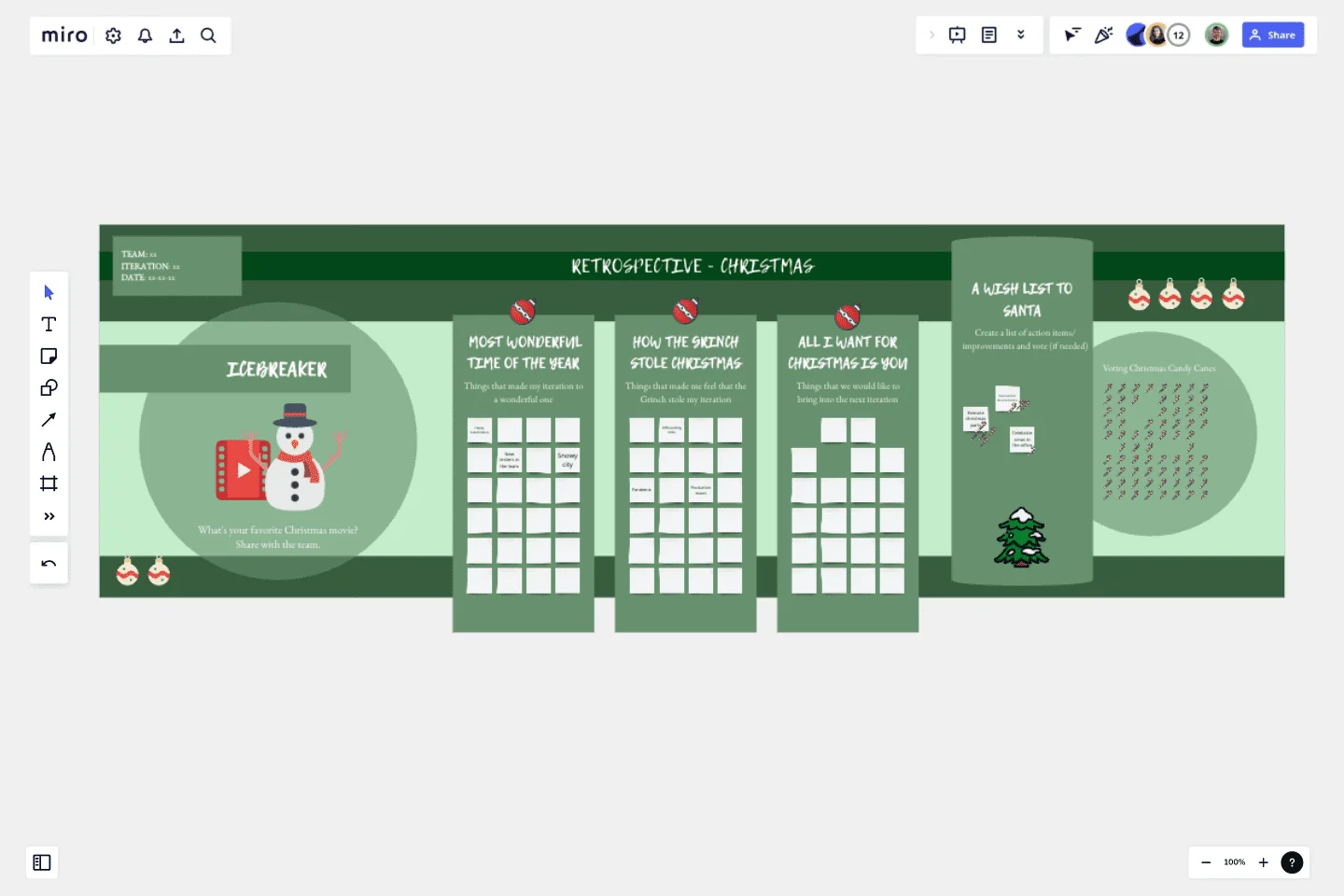Retrospective - Christmas Edition
This is a retrospective with a touch of Christmas.
Start with an icebreaker and share your favorite Christmas movie with the team.
Most wonderful time of the year? - Things that made my iteration to a wonderful one.
How the Grinch stole Christmas? Things that made me feel that the Grinch stole my iteration.
All I want for Christmas is you - Things that we would like to bring into the next iteration.
Tips! Play some music in the background while the team is writing the notes.
This template was created by Nhi Tran.
Get started with this template right now.
Infographic Template
Works best for:
Marketing, Desk Research, Documentation
As we bet you’ve experienced, data can get pretty dense and dry. But you need it to be compelling, memorable, and understandable. The solution? Infographics. These are tools that let you present information in a visually striking way and turn quantitative or qualitative data into stories that engage and resonate. Whoever you’ll be presenting to — customers, donors, or your own internal teams — our template will let you design an infographic that combines text and visuals to break down even the most complicated data.
Cynefin Framework Template
Works best for:
Leadership, Decision Making, Prioritization
Companies face a range of complex problems. At times, these problems leave the decision makers unsure where to even begin or what questions to ask. The Cynefin Framework, developed by Dave Snowden at IBM in 1999, can help you navigate those problems and find the appropriate response. Many organizations use this powerful, flexible framework to aid them during product development, marketing plans, and organizational strategy, or when faced with a crisis. This template is also ideal for training new hires on how to react to such an event.
Midnight Sailboat Retrospective
Works best for:
Retrospectives, Meetings, Agile Methodology
The Midnight Sailboat Retrospective template offers a metaphorical journey through past experiences and future aspirations, likening the retrospective process to a midnight sailboat voyage. It provides elements for reflecting on challenges faced, lessons learned, and goals for the future. This template enables teams to navigate uncertainties, chart a course for success, and foster a culture of resilience. By promoting reflection and metaphorical thinking, the Midnight Sailboat Retrospective empowers teams to overcome obstacles, embrace change, and sail towards their goals effectively.
App Wireframe Template
Works best for:
UX Design, Wireframes
Ready to start building an app? Don’t just imagine how it will function and how users will interact with it—let a wireframe show you. Wireframing is a technique for creating a basic layout of each screen. When you wireframe, ideally early in the process, you’ll gain an understanding of what each screen will accomplish and get buy-in from important stakeholders—all before adding the design and content, which will save you time and money. And by thinking of things in terms of a user’s journey, you’ll deliver a more compelling, successful experience.
Retrospective in the Island of Golocans
Works best for:
Retrospectives, Meetings, Agile Methodology
The Retrospective in the Island of Golocans template offers a creative and imaginative setting for retrospectives, transporting participants to a fictional island setting. It provides elements for reflecting on past iterations, sharing insights, and brainstorming improvements. This template enables teams to step outside their usual environment and approach retrospectives with a fresh perspective. By promoting creativity and storytelling, the Retrospective in the Island of Golocans empowers teams to engage in meaningful discussions, generate new ideas, and foster a culture of innovation effectively.
Rose, Bud, Thorn Template
Works best for:
Retros, Agile
The Rose, Bud, Thorn template is a structured method for team reflection and feedback, designed to help teams identify positive aspects, potential opportunities, and challenges within a project or situation. One key benefit of using this template is its ability to promote balanced feedback and productive discussions, which can lead to improved team processes and outcomes.
